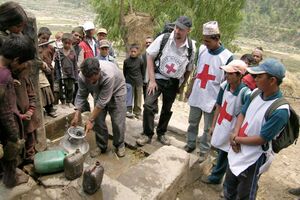AFRC Humanitarian Mission to the Blackhelm Confederacy
The AFRC Humanitarian Mission to the Blackhelm Confederacy represents the Astyrian Federation of Red Cross Societies' commitment to assisting the people of the Blackhelm Confederacy, administering vaccines, providing medical assistance, and handing out food and other supplies as needed in the most imporverished parts of the country.
Prelude
Shortly after the collapse of the Empire of Exponent in 1996, a humanitarian crisis broke out across large swathes of the Hesperidesian continent, as the former empire-wide supply system collapsed and successor states struggled to fill the void. In an effort to stave off full-blown catastrophe and mass starvation, the Astyrian Federation of Red Cross Societies deployed thousands of volunteers to the area. Througout the 2000's, as the Blackhelm Confederacy consolidated control over Western Hesperidesia and established itself as the successor state to the former empire, the mission took on another role of assisting refugees seeking to flee the country and aiding those caught in the conflict that erupted during the re-unification process.
Following the signing of the Katovice Conference in 2004, which ended the period of open warfare in Western Hesperidesia, it was decided that the AFRC would remain in the nation, as stipulated by part of the conditions to end the fighting. Since then, the humanitarian mission has continued, with hundreds of Red Cross volunteers working in many of the most impoverished areas of the country, with operations primarily concentrated along the northern coast of the Blackhelm Confederacy, as well as a hospital ship serving people in the southern port-city of Redemption.
Structure of the humanitarian mission
Hospital ships
The Hope and the Aesculapius are a pair of Aesculapius-class hospital ships stationed in the Blackhelm Confederacy. The Hope is stationed in the city of Redemption, of the southern coast of the country, and the Aesculapius services the northern coast from the city of Cathantaea.
The hospital ships provide for vital secondary and tertiary healthcare, supporting teams deployed to remote areas without access to such care. They are also outfitted with specalised medical teams, capable performing complex medical procedures otherwise not available in the areas of operation. Additionally, they also provide aid to the urban poor within these locations, who typically would not be able to access the kind of high quality care that these vessels are able to provide.
Each vessel is equipped with 12 operating theatres, 35 Intensive Care Units and 500 beds, with the possibility of an extra fifty beds when necessary. The vessels also have a CT scanner, four X-ray machines, laboratories and an ophthalmic unit.
Support to the healthcare

Since the mission start in 2004, AFRC provides a substantial support to the Healthcare in the Blackhelm Confederacy by deploying a large amount of field hospitals across the remote areas of the Confederate jungle as well as supporting logistically the existing scarce hospital network. As of 2023, AFRC is operating two Level 3 field hospitals, twenty six Level 2 field hospitals and twelve Level 1 field hospitals specialised for early detection and treatment of malaria and other infectious diseases. The field hospitals are staffed by a mix of local and international medical and non-medical personnel, totaling the number of staff to around 1,300.
The AFRC also overlooked and coordinated construction of 35 hospitals and 80 polyclinics since the mission start and continues to support them by providing medicines, equipment and staff. On average, over 3,500 tons of medical aid is delivered to the Confederate and AFRC run medical facilities each month.

Another way that AFRC supports healthcare in the Blackhelm Confederacy is through sickness prevention: AFRC has worked on delivering and maintaining freshwater to as many as 435 villages across the Confederacy. Immunisaiton is one of the challenges AFRC is facing in the Blackhelm Confederacy. Since 2004, AFRC has worked on delivering and administering standard and essential vaccines to the Confederate population, such as MMR, DTaP-IPV/Hib and Hepatitis A and B vaccines, boosting the rate of vaccination by 36%.
The AFRC has also been working on capacity building by establishing and supporting nursing schools. There are 6 nursing schools established and operated by the AFRC in the Blackhelm Confederacy, providing education for around 2,400 new nurses on a three year long program. The AFRC also supports and cooperates with Paradisa University's school of medicine, facilitating student's exchange programs and providing literature and studying equipment.
